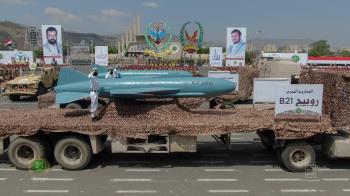Alwaght- In the past few months, a change in the Turkish foreign policy approach and Erdogan's review of relations with other regional and international actors have been grabbing the attention of political observers. Since the Arab uprisings in 2011 and particularly since 2016, Ankara embarked on an active interventionist policy, causing serious tensions with the US, Europe, Saudi Arabia, the UAE, and Egypt, as well as its neighbors Greece and Cyprus.
Joe Biden's presidency in the US and the escalation of tensions between Turkey and the West seem to have persuaded Erdogan to reconsider his foreign policy approach. Meanwhile, one of the countries that has recently taken a center stage in Turkey's softening and de-escalation approach is Syria. In all the years since 2011, Ankara has demanded the unconditional removal of President Bashar al-Assad from power, and even in the years after 2017, in three operations, the Euphrates Shield, the Olive Branch and the Peace Spring, Turkey occupied parts of northern Syria. In the new conditions, however, evidence suggests that Ankara has pursued a policy of de-escalation towards Syria by re-establishing links to the legitimate government in Damascus. What are the main drivers and grounds behind Ankara’s revision of Syria policy?
Change in Ankara view of Damascus
The most significant manifestation of Turkey's shift in attitude towards the Damascus government can be seen in the meeting between Hakan Fidan, the head of Turkey's intelligence apparatus, and his Syrian counterpart Ali Mamluk in the Iraqi capital Baghdad. Over the past few days, the Turkish media have revealed the planning for such a meeting between the top security leaders of the two countries. It is noteworthy that the meeting between Fidan and Mamluk in Baghdad is the second meeting between the two Turkish and Syrian officials. They first met in January 2020 in Moscow.
Ismail Hakki Pekin, the former head of Turkish military intelligence service, commented on such a meeting between Fidan and Mamluk, saying that such process was backed by Russia and Iran for years but made no progress. However, he said, with Fidan developments started that resulted in restoration of diplomatic channels, marking a new period. The former Turkish intelligence official stated that Fidan and Mamluk in Baghdad addressed two issues of the Kurdistan Workers' Party (PKK) and the Syrian refugees. They also discussed Syrian parts where Turkey has sway like Idlib and Daraa and a new roadmap, he continued.
But why is Erdogan putting aside decade-long hostility to Syria?
Syria battleground and political equations: The most important driver is Damascus anti-terror triumphs. Since 2016, Syria began to regain territories lost to foreign-backed terrorists, on top of them ISIS. This brought forth relative stability and security to the Arab country. Contrary to Erdogan and Western countries' initial plans, despite all the financial and logistical help to a litany of terrorist factions, the Syrian government and army, assisted by allies Iran and Russia, succeeded in defeating the takfiri fighters and restoring the rule of law in 70 percent of the territory of the country. In addition, the presidential election of May in which Assad decisively won with 95 percent, cemented the foundation of Assad legitimacy. These developments make Ankara face the fact which there is no way to circumvent interaction and even cooperation with Damascus government in New Syria.
Western-Turkish tensions under Biden heighten, necessitating de-escalation with the East: The second driver for Erdogan's policy shift has to do with the Turkish-Western relations past 2016, the year a military coup, the Turkish leader blamed on the West and allies in the region and at home, was plotted targeting Erdogan. In recent years, Erdogan has been embroiled in tensions with the US and European countries as he pursued a policy of pivot to the East at various levels of policy-making. The state of rifts between Ankara and the West has progressed to the point where political observers have announced the end of Turkey's strategic alliance with the Atlantic region and the beginning of a new era of tension between the two sides. As tensions escalate, looking East is put on Ankara's agenda, but Erdogan is now clearly aware that the prelude to working with the East is closeness to the positions of such actors as Russia, China and Iran. One of the main points where the Turkish stances with these powers clash is Syria. Reviewed Syria policy is the gate to the closeness to the East and Erdogan is taking steps towards that in his new policies.
Turkish home politics drive the review of Syria policy: The third driver for de-escalation with Syria is the political equations inside Turkey. Syrian refugees over the past decade have been a challenging case for the Turkish politicians and parties. Kemal Kılıçdaroğlu, the president of Republican People's Party, repeatedly said that he will return home the Syrian refugees hosted by Turkey. Meral Akşener of Good Party, an opposition party, said she was ready to travel to Damascu to meet Assad government officials in search of a solution for the refugees case. With such atmosphere growing in the Turkish politics, Erdogan and his fellow politicians seek to establish channels with Damascus to avoid the repercussions of refugees challenges, a tactic helping them block the opposition's instrumentalization of the refugees in the election competition.
Preventing anti-Muslim Brotherhood camp power boost: In the past years, the Turkish policies in the region brought Ankara into a confrontation with the opposite camp, represented by Saudi Arabia, the UAE, and Egypt. The three Arab countries form anti-Muslim Brotherhood front in the face of the Turkish and Qatar-led Muslim Brotherhood camp. The precautionary creeping of the three Arab states toward reconciliation with Syria rendered Erdogan concerned about their cooperation with Damascus. By direct talks with the Syrian government, the Turkish officials hope to close down the road to Damascus closeness to Riyadh, Abu Dhabi, and Cairo.



























